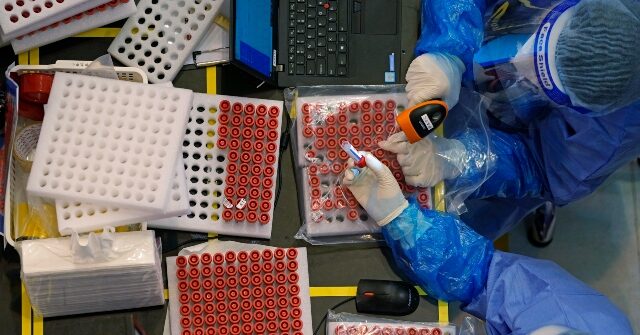China’s plan to expand its pharmaceutical industry along the “Health Silk Road” – the routes of trade and investment created by the Belt and Road Initiative (BRI) – took a step forward on Monday as Shanghai Fosun Pharmaceutical announced the first phase of its new manufacturing plant in the Ivory Coast will be completed by the end of this year.
The Fosun Pharma plant is under construction in Abidjan, the largest city in the Ivory Coast, and is expected to produce some 5 billion tablets of anti-malarial drugs and antibiotics per year once all three construction phases are complete. The demand for such drugs in Africa is immense, with almost 95 percent of worldwide malaria cases emanating from the sub-Saharan region.
“President Xi Jinping promised during the Forum on China-Africa Cooperation (FOCAC) summit last month that Beijing would promote pharmaceutical production and the medical equipment industry in Africa, including access to active pharmaceutical ingredients, through co-investment by Chinese and African private sector players,” the South China Morning Post (SCMP) noted on Monday.
China has been touting the “Health Silk Road” concept since the height of the coronavirus outbreak in 2020, leading to some gallows humor about the Chinese seeking to profit from the high demand for vaccines to combat a pandemic of a disease first documented in their country.
The “Silk Road” was the legendary trade route through Asia and North Africa that flourished for over 1,500 years, until the Ottoman Empire (modern Turkey) finally shut down its trade routes to the West in the 15th Century.
When Chinese dictator Xi Jinping announced his intention in the early 2010s to make a series of massive infrastructure investments along the general lines of the Silk Road, he dubbed it the “Belt and Road Initiative” to evoke the ancient trade route. “Health Silk Road” caught on as the nickname for Xi’s plans to expand the Chinese pharmaceutical industry to developing nations along the trail blazed by those infrastructure projects.
The Health Silk Road was supposed to begin in Italy, the only European nation to join BRI, but China’s vaccines for coronavirus were disappointing and Italy later withdrew from Belt and Road. The Health Silk Road’s best prospects now lie in Africa, where China’s anti-malarial medicines have been much more successful than its coronavirus vaccines were.
Zambia joined the Health Silk Road last week by signing a deal with the Jijia International Medical Technology Corp. of China to build Africa’s first cholera vaccine factory. Nigeria is also working with China to build a pharmaceutical plant in the Lekki free-trade zone of Lagos, with an emphasis on producing HIV medications.
Nigeria once supplied much of Africa with pharmaceuticals manufactured by Western giant GlaxoSmithKline (GSK) and Sanofi, a company specializing in polio vaccines.
GSK and Sanofi announced in August 2023 they would suspend their activities in Nigeria due to “operational difficulties,” particularly those caused by the Nigerian government’s decision to eliminate fixed prices for foreign currency trading to slow the collapse of Nigeria’s currency, the naira.
GSK said the exchange rate was a major reason it could no longer operate in Nigeria without suffering heavy losses, along with rising energy and operational costs. Both companies pledged to work with third-party distributors to guarantee the flow of medicine in Nigeria, but now China is stepping in to fill the production gap.
George Washington University China-Africa specialist David Shinn told the SCMP that overcapacity in the Chinese pharmaceutical industry could be a major driver of growth for the Health Silk Road. To put it bluntly, China will soon be making more medicine than it really needs, thanks to population decline.
“As China’s population decreases, domestic overcapacity will become a growing issue in a variety of industries. Africa is the fastest growing continent in the world and an obvious location for increased pharmaceutical production,” said Shinn.
Another perk of the Health Silk Road is that even with the high costs and production difficulties cited by GSK, Chinese pharmaceutical firms might be able to turn a better profit in Africa because they run on very thin margins in China.
Joseph Wangendo, senior technical officer at the Africa Centers for Disease Control (Africa CDC), on Thursday praised China for making health investments in Africa.
“Over the years, China has consistently demonstrated its commitment to Africa’s health security, most notably through the construction of the Africa CDC headquarters, which stands as a testament to the strength of Africa-China relations,” Wangendo said at a high-level China-Africa development forum.
Wangendo pointed to the mpox outbreak in parts of Africa and the Marburg virus outbreak in Rwanda as examples of challenges that China could help Africa meet.
“We are immensely grateful for the technical support and resources that China has provided, and we look forward to working altogether to strengthen Africa’s preparedness and response capabilities,” he said.
Other African leaders at the forum said China has built hospitals and donated medical equipment to countries like Ethiopia and has helped African nations upgrade their “disease surveillance” capabilities.


